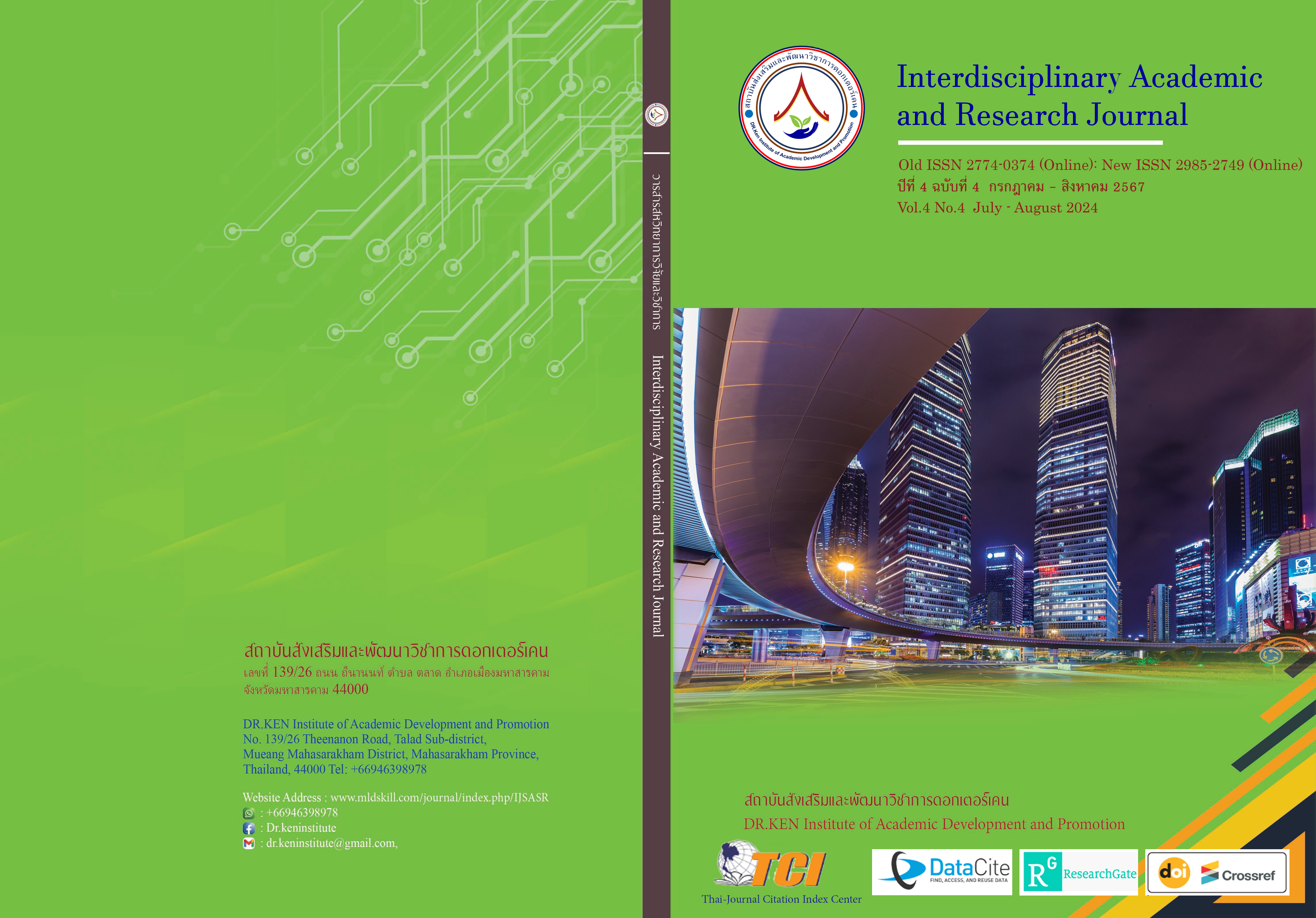A Development of Training Course for Science Teachers with the Concepts of Science Technology and Society
DOI:
https://doi.org/10.60027/iarj.2024.276900Keywords:
Training Courses;, Concepts of Science Technology and Society; , Scientific MindAbstract
Background and Aims: Creating science teacher training programs is crucial to supporting scientific literacy, elevating academic quality, and equipping students for the challenges of the twenty-first century. These courses enable educators to foster curiosity, critical thinking, and creativity in the following generation of scientists and thinkers by providing them with the necessary skills and knowledge. In the end, funding teacher preparation programs is funding society's progress overall and guarantees a better future powered by research and discovery in science. Thus, this research aims to: 1) study the basic information about learning management that is based on concepts of science technology, and society for science teachers. 2) develop a training curriculum. 3) study the effectiveness of the training curriculum. And 4) evaluate the effectiveness of the training curriculum.
Methodology: The participants of the research were 25 science teachers and 400 students. This research was conducted in 4 steps: 1) study the basic information by using basic information and study questionnaire. 2) develop a training curriculum with appropriate assessment results by expert opinion. 3) implementing the training curriculum with evaluated knowledge and understandable basic information about learning management based on concepts of science technology and society for science teachers. 4) effectiveness of the training curriculum. The methods used to collect data were a questionnaire and a scientific mind test. Data analysis using mean, standard deviation statistics, and t-tests.
Results: (1) The training curriculum for science teachers with the concepts of science technology was at the highest level. (2) Training curriculum is appropriate at the highest level. (3) Results of using the training course 3.1) Teacher knowledge and understanding of learning management based on science concepts, and technology. Training is higher than before at the significant level of .05. 3.2) teachers have skills in learning management design based on science concepts and technology. Overall, science teachers were at a high level. 3.3) teachers' opinions on the quality of training curriculum overall, were at a high level. 3.4) the student’s scientific minds from the teachers that trained them in learning management with science concept technology were at a high level. (4) Course evaluation results overall, it is at the highest level.
Conclusion: According to the data, science teachers' training curricula that integrate science and technology concepts is very effective at improving teacher knowledge, skills, and student outcomes. Overall, the evaluation results demonstrate the training course's outstanding quality and impact on teachers and students, confirming its significance in furthering science education.
References
กระทรวงศึกษาธิการ . (2551). หลักสูตรแกนกลางการศึกษาขั้นพื้นฐานพุทธศักราช 2551. กรุงเทพฯ: กระทรวงศึกษาธิการ.
ชลิดา อาบสุวรรณ์และวาสนา กีรติจำเริญ. (2560). การพัฒนากิจกรรมการเรียนรู้วิทยาศาสตร์ตามแนวทฤษฎีการสร้างความรู้เพื่อส่งเสริมทักษะกระบวนการทางวิทยาศาสตร์ จิตวิทยาศาสตร์ และผลสัมฤทธิ์ทางการเรียน หน่วยการเรียนรู้โมเมนตัมและการชน ของนักเรียนชั้นมัธยมศึกษาปีที่ 4. วารสารวิจัยเชียงใหม่. 6(2), 25-26.
นิภาพร ช่วยธานี. (2564). การพัฒนาหลักสูตรฝึกอบรมเพื่อส่งเสริมความสามารถในการจัดการเรียนรู้แบบ Active Learning โดยใช้สื่อนวัตกรรมและเทคโนโลยีเพื่อการเรียนรู้สำหรับอาจารย์ผู้สอนในระดับอุดมศึกษา. รายงานผลการวิจัย: มหาวิทยาลัยเทคโนโลยีราชมงคลศรีวิชัย.
พงษ์เอก สุขใส. (2561). ครูพลในศตวรรษที่ 21. วารสารวิชาการมหาวิทยาลัยฟาร์อีสเทิร์น, 12, 8-21.
พันธศักดิ์ พลสารัมย์. (2563). การพัฒนากระบวนการเรียนรูในระดับปริญญาตรี. กรุงเทพฯ: อรุณการพิมพ์.
วัชรภัทร เดชะวัฒนศิริดำรง. (2565).การพัฒนาหลักสูตรฝึกอบรมเพื่อเสริมสร้างสมรรถนะการสอนการออกแบบนวัตกรรมสำหรับครูกลุ่มสาระการเรียนรู้วิทยาศาสตร์และเทคโนโลยีพื้นที่นวัตกรรมการศึกษาภาคตะวันออก. วารสารครุพิบูล. 9 (2), 197-212.
วิชัย วงษ์ใหญ่. (2538). กระบวนทัศน์ใหม่ในนวัตกรรมหลักสูตร. วารสารการวิจัยทางการศึกษา. 25, 33-37.
วิไลวรรณ สิทธิ. (2560). การพัฒนาหลักสูตรฝึกอบรมเพื่อเสริมสร้างสมรรถนะด้านการจัดการเรียนรู้ตามแนวคิดคอนสตรัคติวิสต์ สำหรับครูสังกัดสำนักงานเขตพื้นที่การศึกษาประถมศึกษานครพนม เขต 2. วิทยานิพนธ์ดุษฎีบัณฑิต : มหาวิทยาลัยราชภัฏสกลนคร.
ศลิษา ณรงค์เลิศฤทธิ์. (2564). การพัฒนาหลักสูตรฝึกอบรมความสามารถในการจัดการเรียนรู้สำหรับนักศึกษาวิชาชีพครูเพื่อส่งเสริมความสามารถในการคิดวิเคราะห์ของนักเรียนระดับประถมศึกษา. วิทยานิพนธ์ดุษฎีบัณฑิต : มหาวิทยาลัยบูรพา.
สงัด อุทรานันท์. (2537). พื้นฐานและหลักการพัฒนาหลักสูตร. กรุงเทพฯ: วงเดือนการพิมพ์.
Bryant, F.B. (1995). Principal components analysis and exploratory and confirmatory factor analysis. In L. G. Grimm & P. R. Yarnold (Eds.), Reading and Understanding Multivariate Statistics. Washington, DC: American Psychological Association.
Saylor, J.G., & Alexander, W.M. (1974). Planning Curriculum for School. New York: Holt, Rinehart, and Winston.
Taba, H. (1992). Curriculum development: Theory and practice. New York: Harcourt Brace.
Tyler, R.W. (1971). Basic principles of curriculum and instruction. Chicago: The University of Chicago Press.
Wilson, J., & Livingston, S. (1996). Process skills enhancement in the STS classroom. In R. E. Yager (Ed.), Science/Technology/Society as Reform in Science Education (pp. 59-69). NY: State University of New York.
Yager, R.E. (1991). The constructivist learning model: Towards real reform in science education. Science Teacher, 58 (6), 52-57
Downloads
Published
How to Cite
Issue
Section
License
Copyright (c) 2024 Interdisciplinary Academic and Research Journal

This work is licensed under a Creative Commons Attribution-NonCommercial-NoDerivatives 4.0 International License.
Copyright on any article in the Interdisciplinary Academic and Research Journal is retained by the author(s) under the under the Creative Commons Attribution-NonCommercial-NoDerivatives 4.0 International License. Permission to use text, content, images, etc. of publication. Any user to read, download, copy, distribute, print, search, or link to the full texts of articles, crawl them for indexing, pass them as data to software, or use them for any other lawful purpose. But do not use it for commercial use or with the intent to benefit any business.
















.png)


